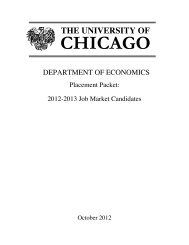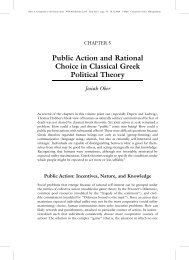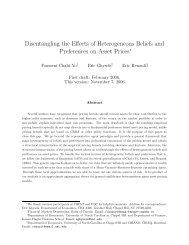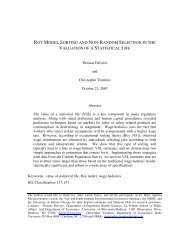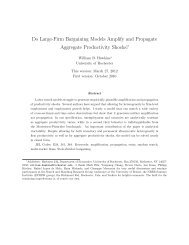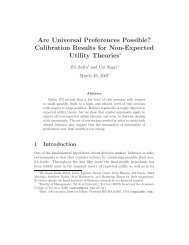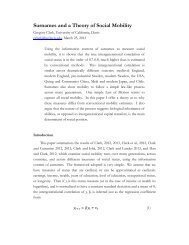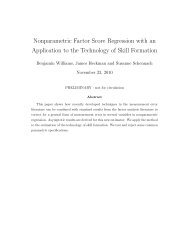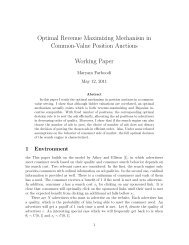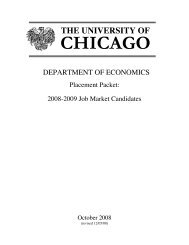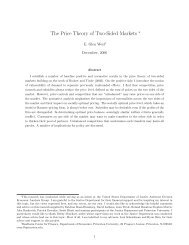Graduate Program Guidebook - University of Chicago Department of ...
Graduate Program Guidebook - University of Chicago Department of ...
Graduate Program Guidebook - University of Chicago Department of ...
Create successful ePaper yourself
Turn your PDF publications into a flip-book with our unique Google optimized e-Paper software.
Grades: Homework assignments (50%) and research project (50%, submitted in July 2014). PQ:Theory <strong>of</strong> Financial Decisions I, II, III; the Economics <strong>of</strong> Information (Harris); one asset pricing PhDcourse with a full treatment <strong>of</strong> continuous-time analysis (either Veronesi or Panageas). (=BUSF35913)39802 ADVANCED LAW AND ECONOMICS (Malani)This seminar examines theoretical and empirical work in the economic analysis <strong>of</strong> law. It will cover,among other things, optimal tort rules, models <strong>of</strong> contract liability and remedies, optimal criminalrules, settlement and plea bargaining, and models <strong>of</strong> judicial behavior. Familiarity with calculus andeither advanced undergraduate microeconomics or graduate microeconomics is expected. Gradeswill be based on class participation and a series <strong>of</strong> research paper proposals. (=LAWS 55401)40101 ADVANCED INDUSTRIAL ORGANIZATION I (Syverson)This is the first course in a sequence in Industrial Organization taught jointly at the Ph.D. level in the<strong>Department</strong> <strong>of</strong> Economics and the Booth School <strong>of</strong> Business. The sequence covers recent theoreticaland empirical approaches in several topics. This course focuses on productivity and industryevolution, advertising and search, product differentiation, vertical relationships, and strategicbehavior. Materials: Carlton and Perl<strong>of</strong>f, Modern Industrial Organization; Tirole, The Theory <strong>of</strong>Industrial Organization. PQ: Solid background in first year Ph.D. level microeconomics andeconometrics, e.g., ECON 30100, 30200, or 30300 and ECON 31000, 31100, or 31200. (=BUSF33921)40201 ADVANCED INDUSTRIAL ORGANIZATION II (Hortaçsu)This is the second course in the Industrial Organization Field sequence. This course focuses oneconometric models <strong>of</strong> consumer demand, dynamic models in industrial organization, structuralestimation <strong>of</strong> auction, matching, and search models. Strong preparation and interest in econometricand microeconomic modelling and pr<strong>of</strong>iciency in statistical/mathematical programming packages(R/Matlab/Stata) recommended. (=BUSF 33922)40301 ADVANCED INDUSTRIAL ORGANIZATION III (Carlton)This course will complement the other courses in the Ph.D. sequence for industrial organization andwill focus on topics closely related to antitrust economics and regulation. Topics will include barriersto entry, adjustment costs, mergers, demand estimation, damage estimates, oligopoly theory, pricefixing, optimal price discrimination, bundling, tie in sales, two sided markets including credit cards,the theory <strong>of</strong> optimal regulation, and the empirical facts <strong>of</strong> regulation. The course is primarily forPhDs in economics and business, but advanced law students interested in antitrust and regulation plusadvanced and interested MBAs are welcome. Grades: Homework plus final. PQ: previous trainingin advanced economics or antitrust. (=BUSF 33923 =LAWS 99304)40501 PRICE THEORY AND MARKET DESIGN (Weyl)Price theory studies how the statistical behavior <strong>of</strong> large numbers <strong>of</strong> individuals in an economy canbe summarized by simple prices. Market design asks how social institutions can be engineered inpractical settings to operate more efficiently. This course uses the methodology <strong>of</strong> classical pricetheory to analyze classic problems <strong>of</strong> market design, to which they are well-suited but not frequentlyapplied. We will use these principles to study, among many other questions, the efficient andequitable allocation <strong>of</strong> private goods, new alternatives to voting to allocate public goods and the bestdegree, the design <strong>of</strong> insurance markets and how to make markets statically competitive whileensuring appropriate incentives for innovation. The course employs and teaches students a range <strong>of</strong>techniques, from philosophical inquiry to computational methods that form complementarycomponents <strong>of</strong> the price theoretic approach and are crucial to plausible and practical market designs.(=ECON 24210)23



